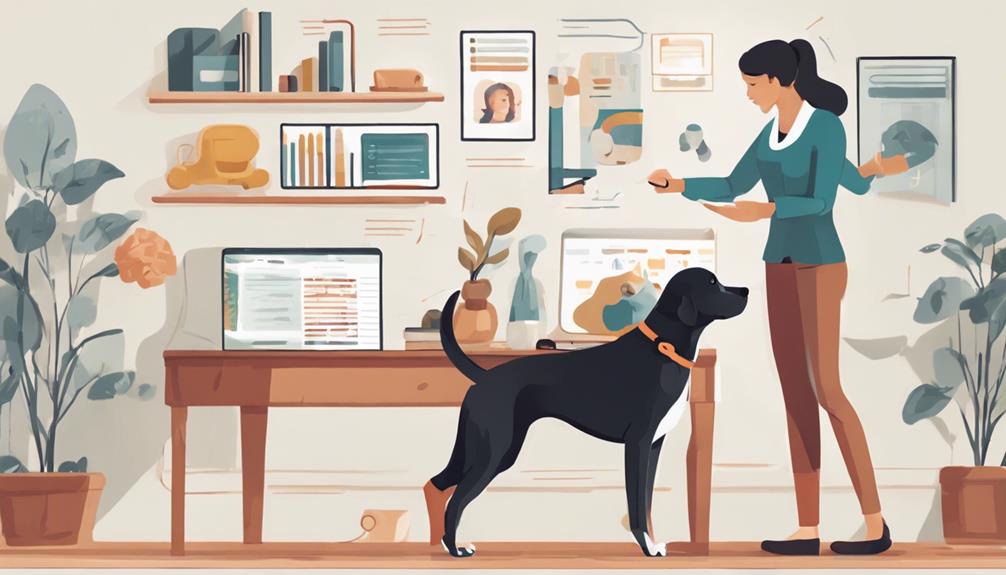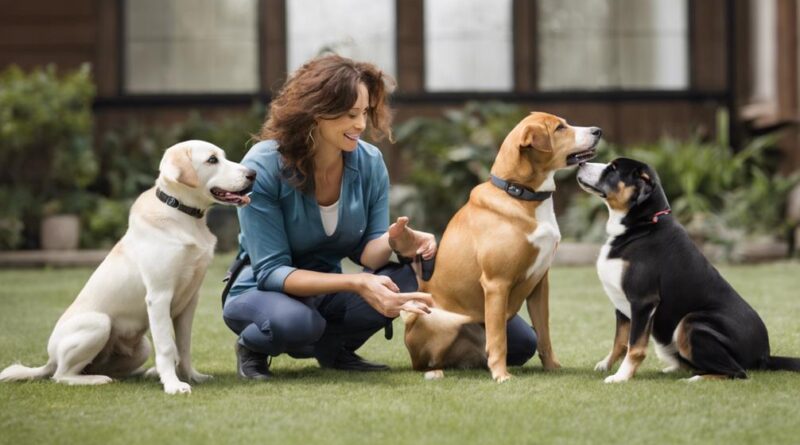Why Opt for Professional Dog Behavior Consultation?
Opt for professional dog behavior consultation to benefit from tailored expertise beyond basic training. Gain insight into your pet's needs and focus on behavior modification with experts who understand canine actions and develop effective strategies. Utilize positive reinforcement techniques and structured sessions for positive responses. Understand triggers, body language, and foster a stronger bond through communication and training. Address aggression and anxiety with personalized solutions ensuring your furry friend's well-being. Learn about long-term behavior modification techniques that involve positive reinforcement, desensitization, and counterconditioning. Continued support guarantees sustained improvements tailored to your dog's individual needs, leading to long-term success.
Benefits of Professional Consultation
When seeking professional dog behavior consultation, you gain access to expert guidance tailored to your pet's specific needs. Behavior modification is a key focus during these consultations, where professionals analyze your dog's actions and reactions to develop effective strategies. These experts possess a deep understanding of how to address various behavioral issues, whether it be aggression, anxiety, or excessive barking.
Professional consultation offers a range of training methods that are proven to be effective in modifying your dog's behavior. Trainers utilize positive reinforcement techniques to encourage good behavior, while also implementing corrective methods when needed. Through structured training sessions, your dog can learn to respond positively to commands, socialize with other animals, and overcome any behavioral challenges they may face.
Understanding Canine Behavior Patterns
Understanding canine behavior patterns is crucial for effectively addressing and managing your dog's actions and reactions. By paying attention to your dog's body language, you can gain valuable insights into their emotions and intentions. Canine body language includes tail position, ear orientation, eye contact, and overall posture. For instance, a tucked tail or ears held back may indicate fear or anxiety, while a wagging tail with loose, relaxed movements often signifies happiness and friendliness.
Behavioral triggers are specific stimuli or situations that can elicit certain responses from your dog. These triggers can vary widely from one dog to another and understanding what sets off your dog's unwanted behaviors is essential in addressing and modifying them. Common behavioral triggers include loud noises, unfamiliar environments, interactions with other animals, or certain physical sensations.
Tailored Solutions for Behavior Issues
To effectively address behavior issues in dogs, personalized solutions tailored to each individual dog's specific triggers and reactions are crucial. A personalized approach involves understanding the unique personality, history, and environment of the dog in question. Behavior modification techniques are then customized to suit the needs of the dog and the goals of the owner. This tailored approach ensures that the root cause of the behavior issue is identified and addressed effectively.
When implementing a personalized approach to behavior modification, it's essential to consider factors such as the dog's breed, age, past experiences, and overall health. By taking these individual differences into account, professional behavior consultants can develop a targeted plan to address the specific behavior issues exhibited by the dog.
Furthermore, a personalized approach allows for flexibility in the treatment plan. As the dog progresses and responds to the behavior modification techniques, adjustments can be made to optimize results. This adaptability is key to achieving long-lasting behavior changes and improving the overall well-being of the dog.
Building a Stronger Human-Dog Bond
Consider enhancing the connection between you and your canine companion through strategies that foster a deeper bond. Building a stronger human-dog bond is crucial for a harmonious relationship and can positively impact your dog's behavior. One key aspect of strengthening this bond is through positive reinforcement. By rewarding good behavior with treats, praise, or playtime, you're reinforcing positive actions and creating a sense of trust and cooperation between you and your furry friend.
Communication skills play a vital role in bonding with your dog. Understanding your dog's body language, vocalizations, and overall behavior can help you interpret their needs and emotions more effectively. Similarly, learning how to effectively communicate your expectations to your dog can improve mutual understanding and prevent misunderstandings that may strain your relationship.
Spending quality time together engaging in activities such as training sessions, interactive play, or simply going for walks can also strengthen the bond between you and your dog. These shared experiences create lasting memories and deepen the emotional connection you share with your canine companion.
Professional Training Techniques Overview
What're the key professional training techniques that can enhance your relationship with your canine companion?
Positive reinforcement and clicker training are two highly effective methods that professional dog behavior consultants often utilize. Positive reinforcement involves rewarding your dog for displaying desirable behaviors. This can be done through treats, praise, or toys, reinforcing the idea that good behavior leads to positive outcomes. By focusing on rewarding good behavior rather than punishing bad behavior, you can create a more positive and trusting relationship with your furry friend.
Clicker training is another popular technique that's based on the principles of operant conditioning. The clicker is used as a marker to indicate the exact moment your dog performs the desired behavior, followed by a reward. This precise marking helps your dog understand exactly what they're being rewarded for, making the training process clearer and more effective.
These techniques not only help in teaching your dog new commands and behaviors but also in strengthening the bond between you and your canine companion. They encourage communication, trust, and mutual understanding, laying a solid foundation for a harmonious relationship. Professional trainers are skilled in implementing these techniques effectively, ensuring that you and your dog can enjoy a positive and fulfilling partnership.
Addressing Aggression and Anxiety
Enhancing your relationship with your canine companion involves effectively addressing aggression and anxiety behaviors that may arise. These issues can be complex and challenging, requiring a tailored approach to ensure the well-being of your furry friend. Professional dog behavior consultation can provide the expertise needed to manage aggression and relieve anxiety in your dog through behavioral modification and specialized training techniques.
When dealing with aggression management and anxiety relief in dogs, it's crucial to consider the following:
- Behavioral Evaluation: A professional behavior consultant will conduct a thorough assessment of your dog's behaviors to identify triggers for aggression and anxiety. This evaluation forms the basis for developing a personalized behavior modification plan to address these issues effectively.
- Training Techniques: Implementing appropriate training techniques is essential in reshaping your dog's responses to stimuli that provoke aggression or anxiety. Positive reinforcement methods, desensitization, and counterconditioning are commonly used to modify behaviors and promote a sense of security in your pet.
- Consistency and Patience: Consistency in applying the recommended strategies and patience are key when working towards reducing aggression and anxiety in your dog. It's essential to understand that behavioral changes take time and effort, requiring ongoing support and guidance from a professional to achieve long-lasting results.
Long-Term Behavior Modification Strategies

To effectively address long-term behavior modification in your dog, implementing structured training routines and consistent reinforcement strategies is paramount. Behavior analysis plays a crucial role in understanding the root causes of your dog's behaviors. Through behavioral assessment, professionals can create personalized plans tailored to your dog's specific needs. Training techniques such as positive reinforcement, desensitization, and counterconditioning are commonly used to modify behaviors over the long term.
Positive reinforcement involves rewarding your dog for displaying desirable behaviors, encouraging them to repeat those actions. Consistency in rewarding good behavior helps strengthen the desired responses. Desensitization aims to reduce your dog's sensitivity to certain triggers by gradually exposing them to these stimuli in a controlled manner. This technique can be effective in addressing fear-based behaviors or aggression.
Counterconditioning focuses on changing your dog's emotional response to a particular stimulus. By associating the trigger with a positive experience, such as treats or play, your dog can learn to react differently in challenging situations. These training methods require patience, commitment, and a deep understanding of your dog's behavior patterns.
Importance of Continued Support
Continued support is a fundamental pillar in maintaining the progress achieved through behavior modification strategies for your dog. It's crucial to understand the significance of ongoing guidance in ensuring the long-term success of behavior modification interventions. Here are three key reasons why continued support is essential in the journey towards improving your dog's behavior:
- Consistency: Consistent support and reinforcement of positive behaviors are vital for sustaining the changes implemented during behavior modification. Without ongoing guidance, your dog may revert to old habits, hindering the progress made through previous interventions.
- Adaptability: Behavior modification isn't a one-size-fits-all solution. Continued support allows for adjustments to be made based on your dog's responses and progress. Ongoing guidance enables the modification of strategies to better suit your dog's individual needs, ensuring a more tailored and effective approach to behavior improvement.
- Long-Term Success: The journey towards modifying your dog's behavior is a marathon, not a sprint. Continued support provides the necessary framework for maintaining and reinforcing positive changes over time. With ongoing guidance, you can navigate challenges, celebrate successes, and work towards sustained behavior improvements that benefit both you and your furry companion in the long run.
Frequently Asked Questions
How Can I Determine if My Dog's Behavior Warrants Professional Consultation?
To determine if your dog's behavior needs professional consultation, start with a behavior assessment. Look for persistent issues that impact your dog's well-being or safety.
If problems persist despite your efforts, consider professional help. Trained experts can design personalized training programs, incorporating behavioral modification techniques like positive reinforcement.
Their experience can provide valuable insights and support for addressing complex behavior issues effectively. Trust your instincts and seek guidance if needed for your furry companion's welfare.
What Are the Common Misconceptions About Dog Behavior Consulting?
When considering misconceptions about dog behavior consulting, it's crucial to understand that training methods vary in effectiveness. Behavioral modification techniques are tailored to individualized needs, debunking the myth of a one-size-fits-all approach.
Avoid assuming that professional consultation always involves harsh tactics; many experts rely on positive reinforcement. Trust the process and seek reputable professionals who prioritize your dog's well-being for successful outcomes.
Can Professional Consultation Help With Specific Breed-Related Behavior Issues?
When dealing with specific breed-related challenges, professional behavior consultation can be invaluable. Expert guidance can pinpoint breed-specific behavioral issues and tailor training techniques accordingly.
Behavioral modification strategies are crucial for addressing these challenges effectively. With the right support, you can navigate and overcome breed-specific behavior issues, ensuring a harmonious relationship with your furry companion.
Trust in the expertise of professional consultants to provide targeted solutions for your dog's specific needs.
How Long Does It Typically Take to See Improvements After Consultation?
Typically, training progress and behavior modification vary depending on the dog and the issues at hand. After professional consultation, you can expect to see initial improvements within a few weeks as you implement recommended strategies.
However, more complex behaviors may require longer timelines for significant changes to take place. It's essential to be patient and consistent in your efforts to see lasting results in your dog's behavior.
Are There Resources Available for Ongoing Support Post-Consultation?
After a professional dog behavior consultation, you can find resources for ongoing support. Consider joining online forums to connect with other pet owners facing similar challenges.
Additionally, enrolling in training classes can provide structured guidance and assistance. These resources offer continuous learning opportunities and a supportive community to help you navigate your dog's behavior journey effectively.
Accessing these resources can enhance your understanding and implementation of behavior modification techniques for lasting results.
Conclusion
In conclusion, opting for professional dog behavior consultation offers numerous benefits. These include tailored solutions for behavior issues, building a stronger bond with your furry friend, and access to expert training techniques.
By understanding canine behavior patterns and addressing issues like aggression and anxiety, you can work towards long-term behavior modification strategies. Remember, continued support is key in ensuring the success of your dog's behavior improvement journey.
Choose professional consultation for the best results in enhancing your dog's well-being and your relationship with them.
